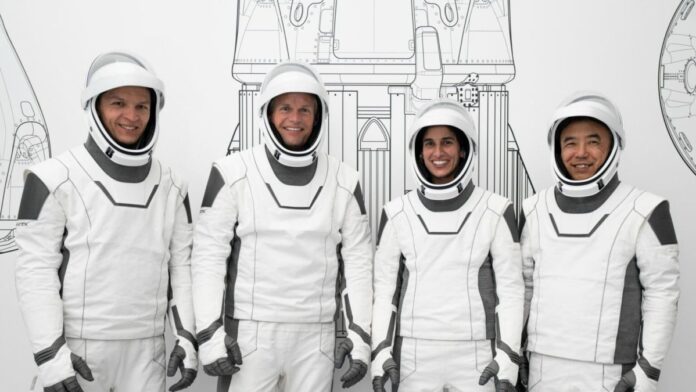We’ll have to wait two additional days for the launch of SpaceX’s next astronaut mission to the International Space Station (ISS) for NASA.
That flight, called Crew-7, had been scheduled to lift off on Aug. 15 atop a Falcon 9 rocket from Pad 39A at NASA’s Kennedy Space Center in Florida. But the agency and SpaceX announced today (July 25) that they’re now targeting Aug. 17.
The slight slip is a consequence of another SpaceX mission — the planned launch of the Jupiter 3 communications satellite atop a Falcon Heavy rocket on Wednesday night (July 26) from Pad 39A.
“Because of the turnaround of the launch pad from that Falcon 9 Heavy configuration to the configuration we use for crew, we’ll adjust the launch date to the 17th of August,” Steve Stich, manager of NASA’s Commercial Crew Program, said during a news conference today.
Related: SpaceX launches Crew-6 astronaut mission to space station for NASA
Crew-7’s liftoff will occur at 6:56 a.m. EDT (1056 GMT) on Aug. 17, Stich added. You can watch the launch live here at Space.com, courtesy of SpaceX.
The mission will send four people — NASA’s Jasmin Moghbeli, Andreas Mogensen of the European Space Agency, Japan’s Satoshi Furukawa and Russian cosmonaut Konstantin Borisov — to the ISS aboard a SpaceX Dragon capsule named Endurance.
If all goes according to plan, Endurance will dock with the orbiting lab about 20 hours after launch, around 2:45 a.m. EDT (0645 GMT) on Aug. 18, Stich said today. That arrival will get the wheels turning on the departure of SpaceX’s Crew-6 mission, which reached the ISS on March 3. Crew-6 is scheduled to return to Earth on Aug. 25, Stich added.
As its name suggests, Crew-7 will be the seventh operational astronaut mission that SpaceX flies to the orbiting lab for NASA. But it will be the company’s 11th crewed flight overall; SpaceX also launched the Demo-2 test mission to the ISS in 2020; the private Inspiration4 flight to Earth orbit in September 2021; and the Ax-1 and Ax-2 missions to the station in April 2022 and May 2023, respectively.
Ax-1 and Ax-2 were organized by the Houston company Axiom Space, which plans to begin operating its own space station in low Earth orbit in the late 2020s.

